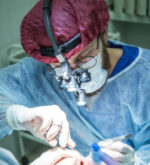
While cognition, intelligence, knowledge, and research are mandatory for a surgeon, it takes manual dexterity for surgery to be successful.
In a New York Times article, Kate Murphy quotes Dr. Spetzler – – a brain surgeon with more than 40 years experience, know for his virtuosity in the operating room: “The sooner you begin doing a physical, repetitive task, the more ingrained and instinctive that motor skill becomes. What makes a great surgeon is unrelenting practice.”
Unrelenting practice is how we develop procedural learning. Dr Spetzler developed his dexterity as a child by playing the piano. And he began performing surgery in high school — on gerbils. All of them survived.
Psychotherapists work with the brain in different ways. Our skill set need not include manual dexterity. What we need to be proficient in is implicit relational knowing.
Why is that?
The healing experience is intersubjective. That is, the therapist is aware of not being an all-knowing, objective observer. The therapist is a fellow human being, subject to the vagaries of the human condition. As the implicit relational knowing of client and therapist intersect, there is the opportunity to explore ways of relating and making meaning.
The therapist needs to be skilled in navigating the intricacies of the relational implicit in the heat of the interaction, with a client who may be triggered. Like manual dexterity, this is a skill set that improves through practice, such as the practice of tracking embodied experience.
Photo: Olga Guryanova / Unsplash